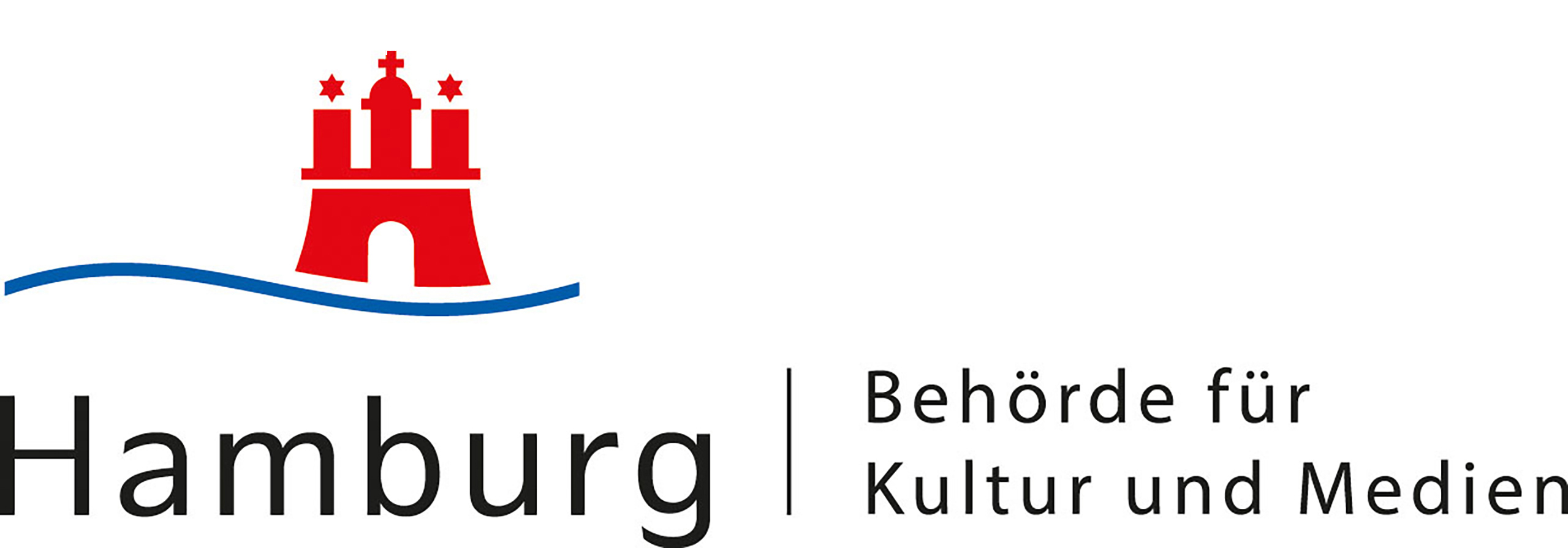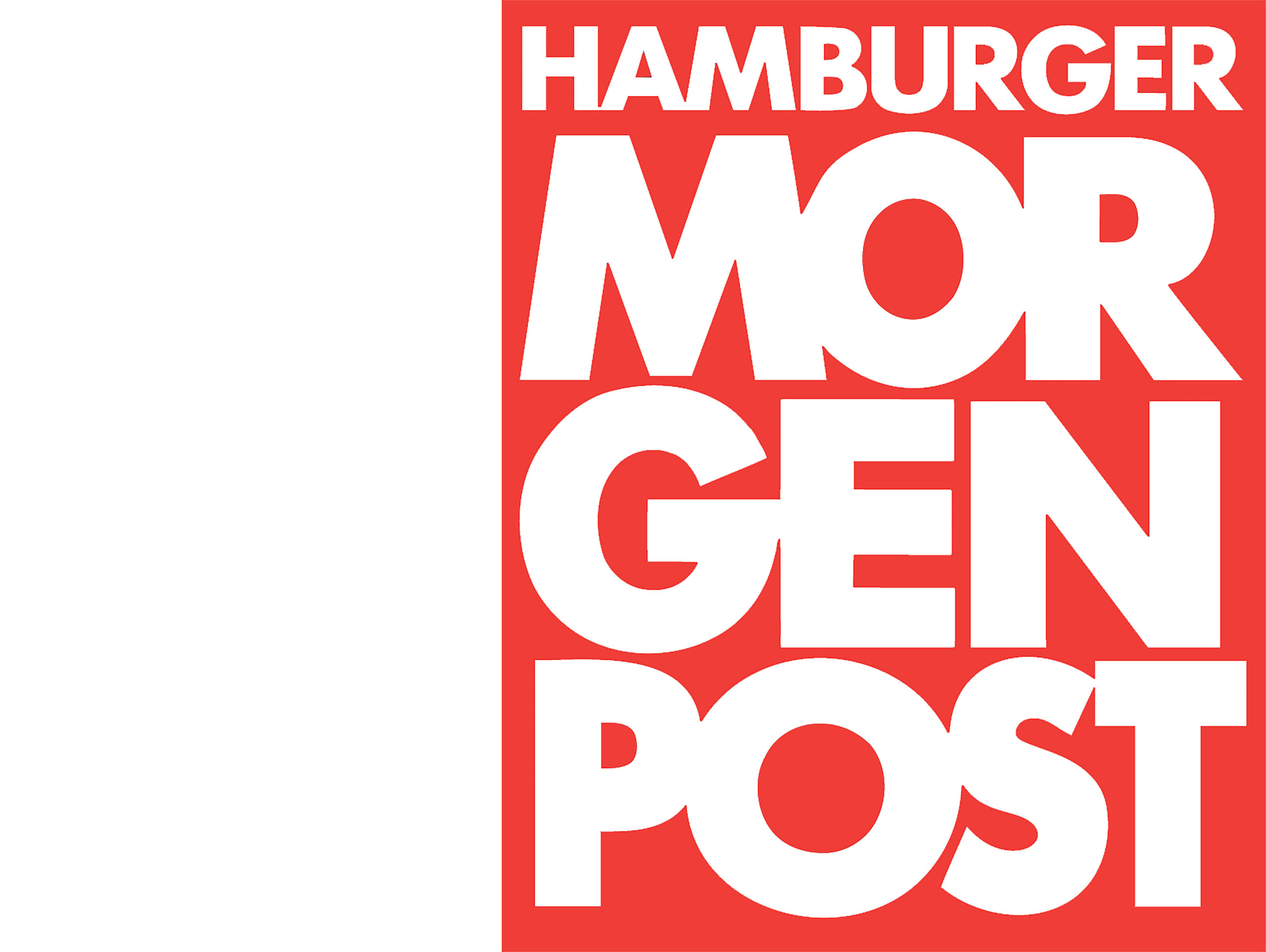Third PEN Berlin Congress: »On we go«
Hamburg, 2 November 2024. All contributions to read and/or listen to
Etgar Keret: »What to do now?«
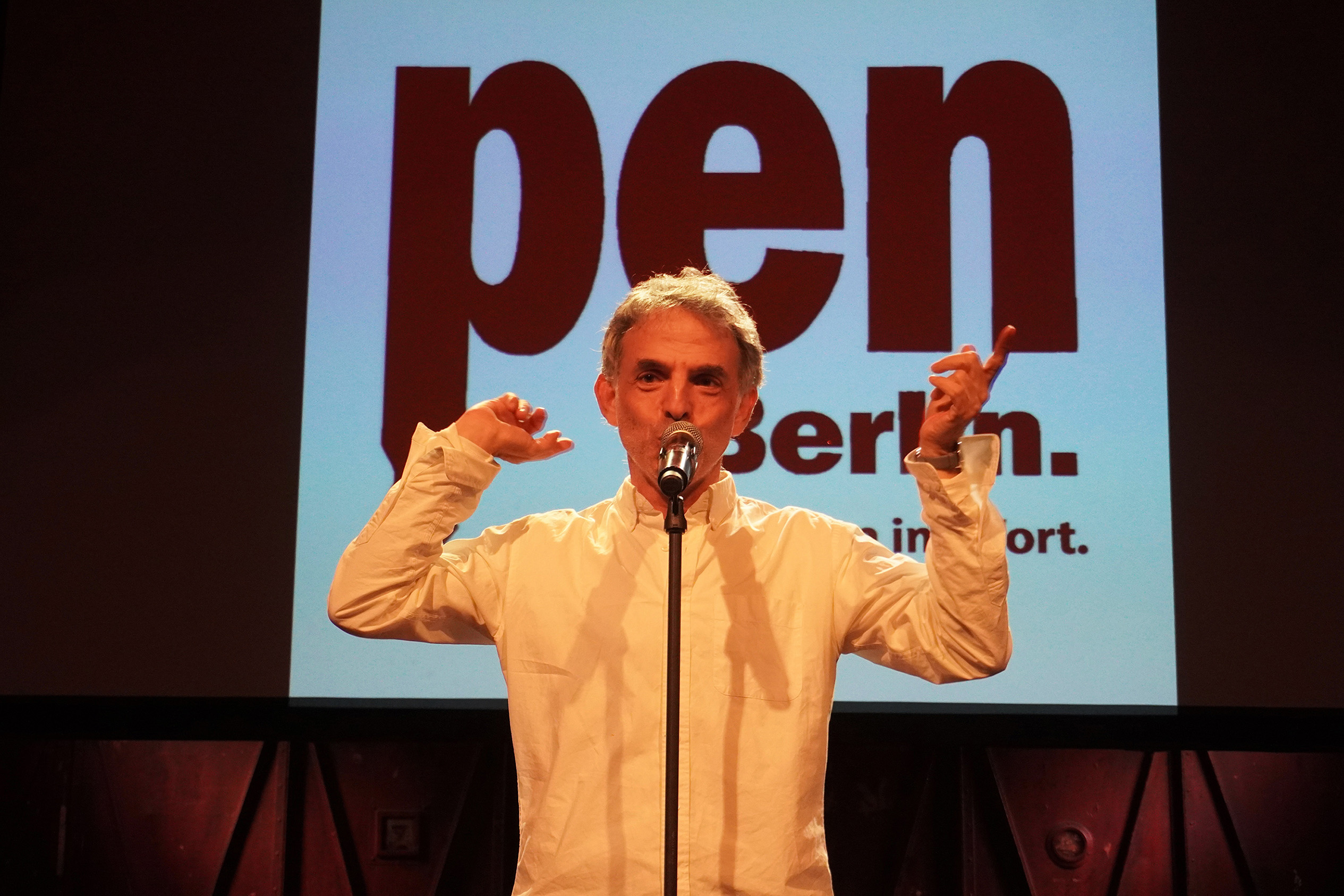
Introduction by Daniel Dylan Böhmer (journalist): »When I first met Etgar Keret, he was in his early thirties and was seen as a threat to Israeli literature.« TEXT and AUDIO [both in German]
Keynote speech by Etgar Keret (writer): »We would listen to Wagner in our home and when the neighbors would come, at the time it was a big thing, then the neighbors would say to my mother: ›You know, that the Nazis loved Wagner?« And my mother said: ›Yeah. And Nazis also liked Apfelstrudel. You want me not to eat Apfelstrudel?« They say: ›Yeah, but you know, Wagner himself, he was an anti-Semite.« And my mother said: ›Oh, I know. And if he was in this living room, I would have poisoned him. But I think he’s a great composer, don’t you think? I like this part…‹ (…) So, this idea of kind of owning your story, being able to hold on to that story and making the story your own, not letting people push you into their story, I think that is something that is crucial for me these days.« TEXT and AUDIO [both in English]
Eva Menasse: »Only this way – on we go«
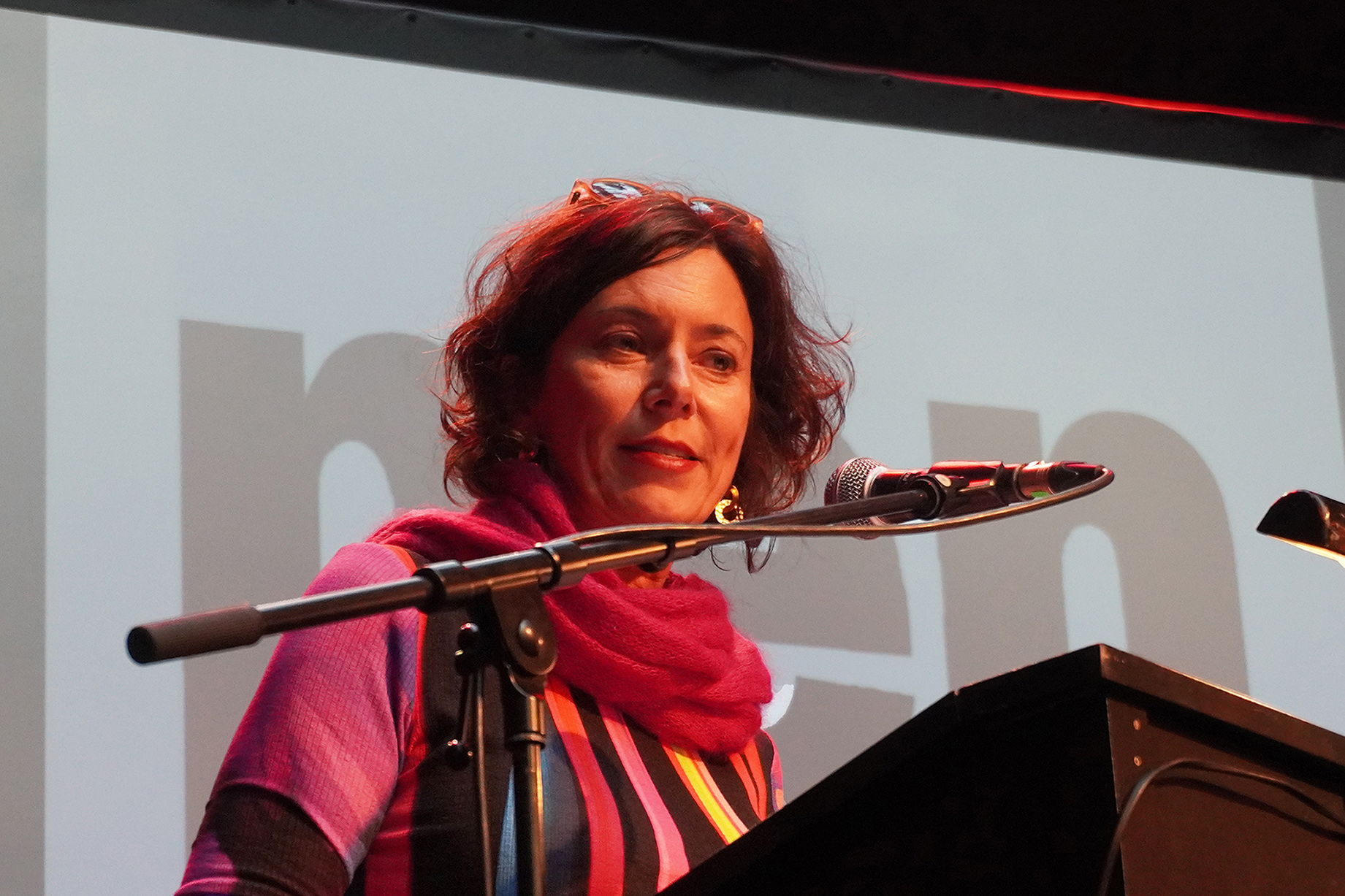
Opening speech and farewell address: »Two and a half years ago, together with Deniz Yücel and many others, I threw myself into this mad adventure of founding a new PEN – because it was what I had missed most in Germany: an active, vibrant association of writers. A coming together of people who write – all of them individualists, often enough contrarians – yet who value their smallest common denominator, ›We can write freely and without interference in this country‹, highly enough to forge it into a strong platform. A platform that defends freedom of expression, of the arts and of academia – for everyone and in all directions – and that, when necessary, organises controversial, difficult, and delicate debates itself. A platform broad and solid enough to help at least some of those colleagues who, in their own countries, are persecuted, imprisoned, tortured, or forced into exile for nothing more than what they wrote or said.« TEXT und AUDIO [German]
Ivan Krastev and Fintan O’Toole: »That’s the Mope-Syndrom − Most Oppressed People Ever«
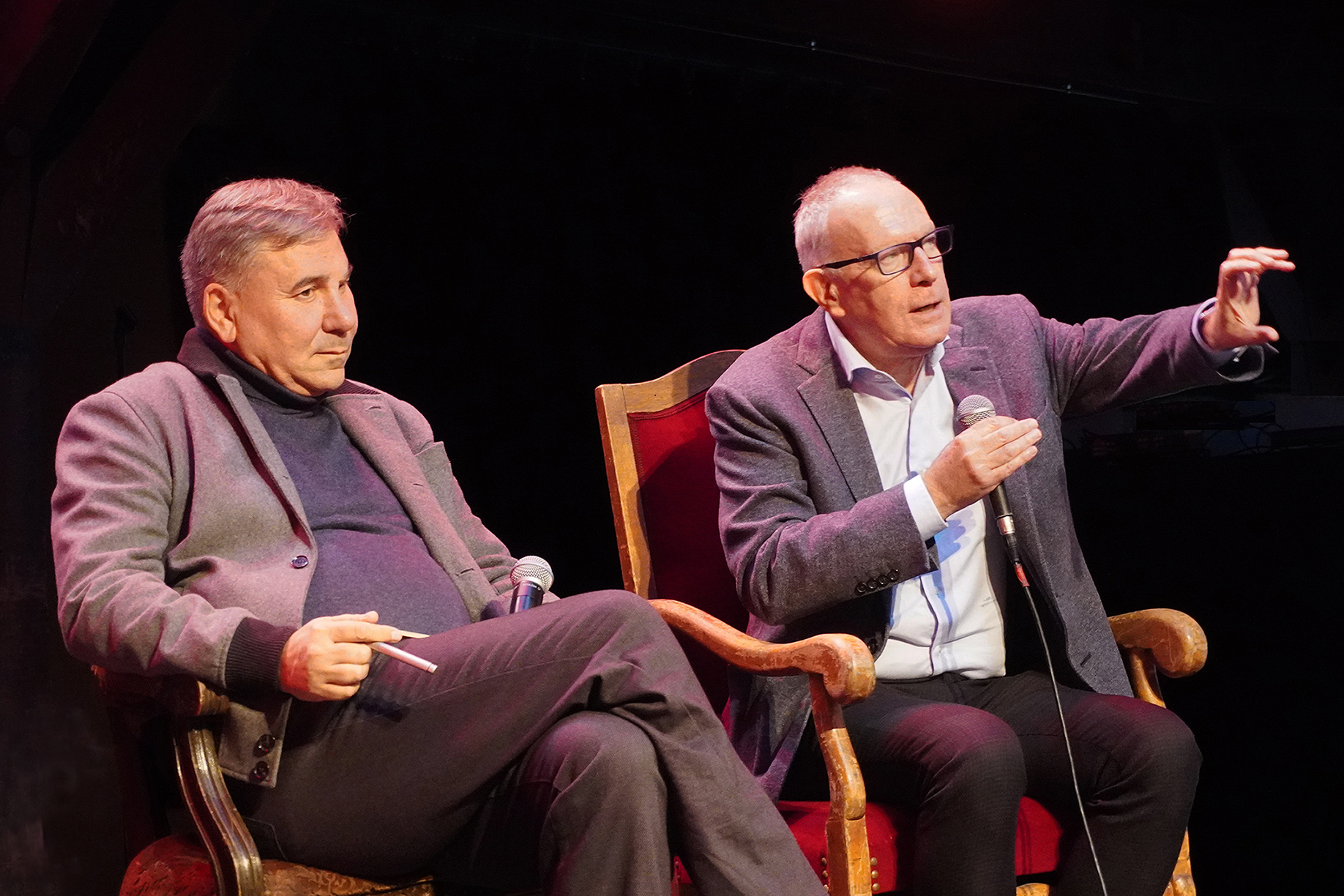
»Handbook to the end of the world«: The Bulgarian political scientist Ivan Krastev and the Irish commentator Fintan O’Toole in talk with Eva Menasse:
O’Toole: »It’s much more to do, particularly, I would say, particularly on the Trump side, about a kind of sense of sticking it to the people we really hate. That becomes the main driving force and develops its own logic: they did this to us, so we have to do it back to them. (…) Somebody in Belfast came up with this idea of what they called Mope Syndrome. Mope is the English word for feeling sorry for yourself. Mope Syndrome also stands for M.O.P.E. – Most Oppressed People Ever..«
Krastev: »I was re-reading all the interesting stuff written just after the end of the Cold War. And paradoxically, the most interesting book came neither from Huntington nor Fukuyama, but from a German author – Enzensberger’s ›Civil War‹, written in 1993. If you re-read it now, you’ll be shocked.« AUDIO [English]
Stella Nyanzi: »Uganda is an open-air prison«
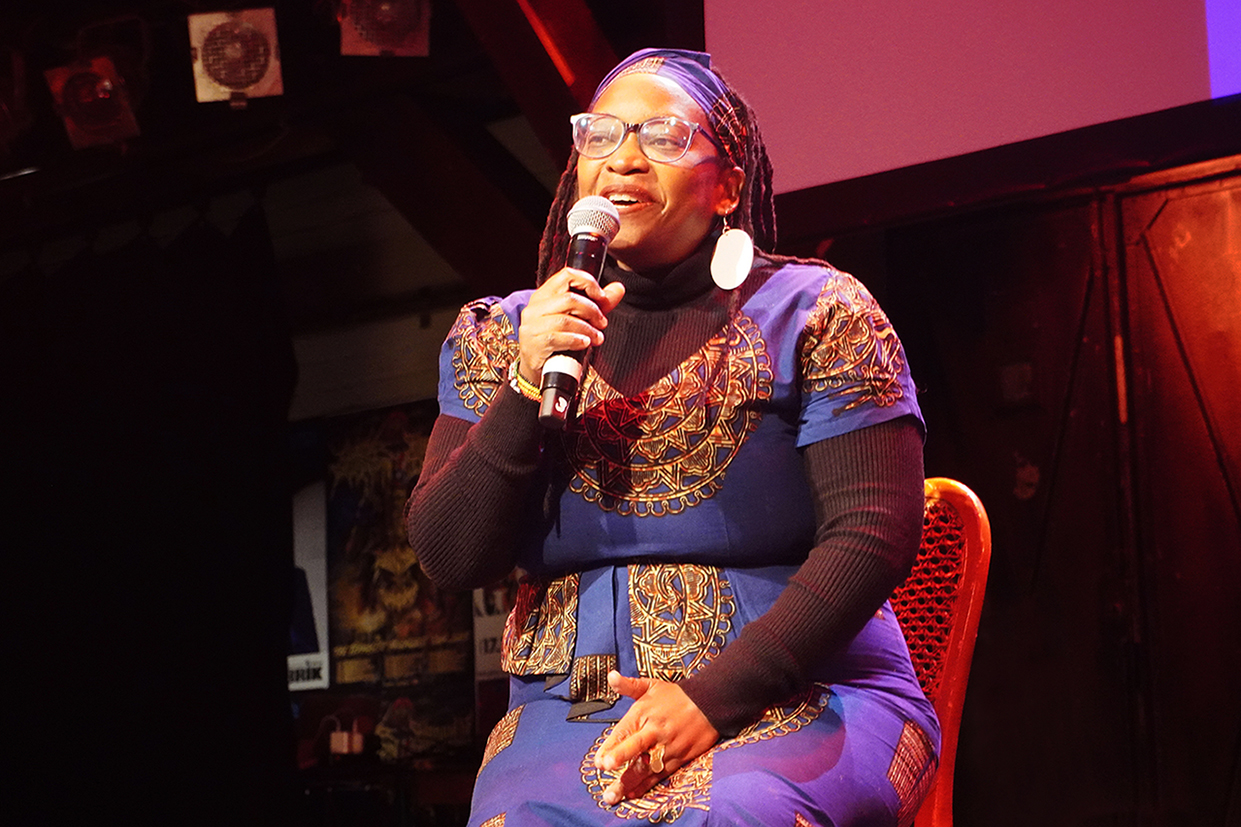
»Uganda: Gay persecution as reason of state?«: The Ugandan anthropologist and poet ugandische Anthropologin und Lyrikerin Stella Nyanzi in talk with Sophie Sumburane: »I think a lot of us have heard about the anti-homosexuality law in Uganda, yes? (…) We know about the death penalty? And we know about life imprisonment? (…) And we know there are prison sentences, and we know there are monetary fines, and we know there is healing of the mind – or reconstruction of personality, psychotherapy. But what a lot of people do not know is perhaps what pertains to writers and authors and journalists – which is around freedom of expression. (…) There is a section of the law against promotion of homosexuality, and one of the things that it penalizes for up to twenty years in prison is production of knowledge and information about homosexuality. (…) While the criminalization of homosexuality is terrible – the discrimination against same-sex-loving people is terrible – to criminalize production of knowledge is unacceptable.« AUDIO [English]
Philipp Ruch, David Werdermann & The Audience: »Ban the Nazis?«
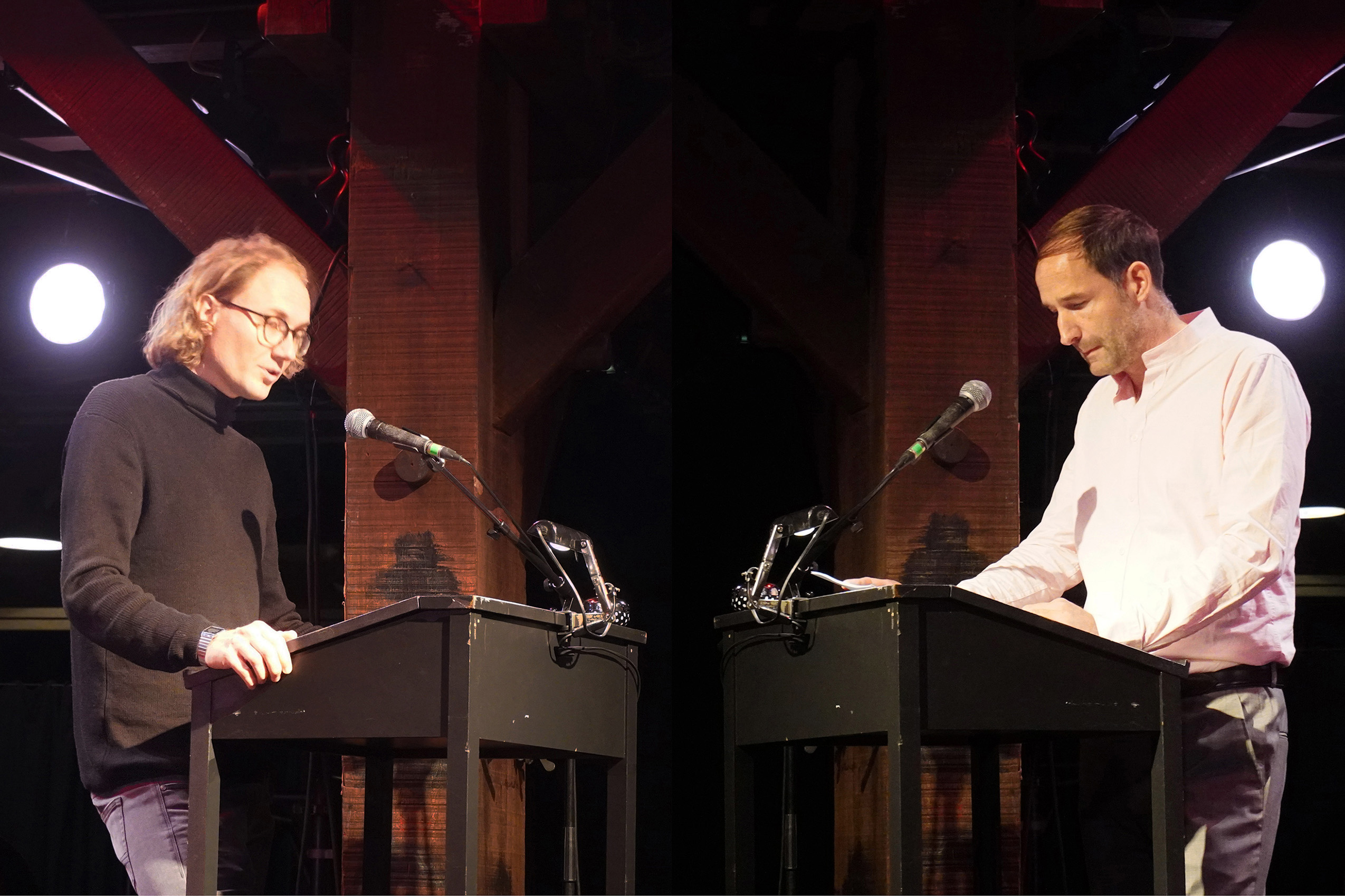
Impulse talks by author Philipp Ruch and lawyer David Werdermann, followed by audience debate.
Ruch: »The AfD doesn’t harbor ›fantasies of violence‹. What it demands and promises are state crimes. (…) Even though Walter Lübcke was shot by an AfD campaign aide. Even though in Thuringia the house of a party colleague of the chancellor is set on fire, Scholz, Olaf, recommends as a prescription against the AfD: ›Go vote‹. Well, people did vote. And how.« TEXT and AUDIO [both in German]
Werdermann: »Fascism is a crime. But the advocacy of fascism is an opinion. And as such, it must not be prohibited because of its content. (…) Bans are, in many cases, not only questionable in terms of democratic theory and the law, but also strategically unwise. The situation is serious, but that’s no reason to throw democratic principles overboard.« TEXT und AUDIO [both in German]
Audience: »We can’t escape the dialectic that, by invoking open debate, we may in fact be working toward its abolition. Still, I see the only viable course of action as acting like Philipp Ruch – and placing the memorial, as a model, in front of Höcke’s door. If the AfD no longer existed, Ruch couldn’t do that anymore. That’s why I’m against a ban.« AUDIO [German]
Culture in Eastern Germany: »Saxony, a land of culture, is on the verge of collapse«
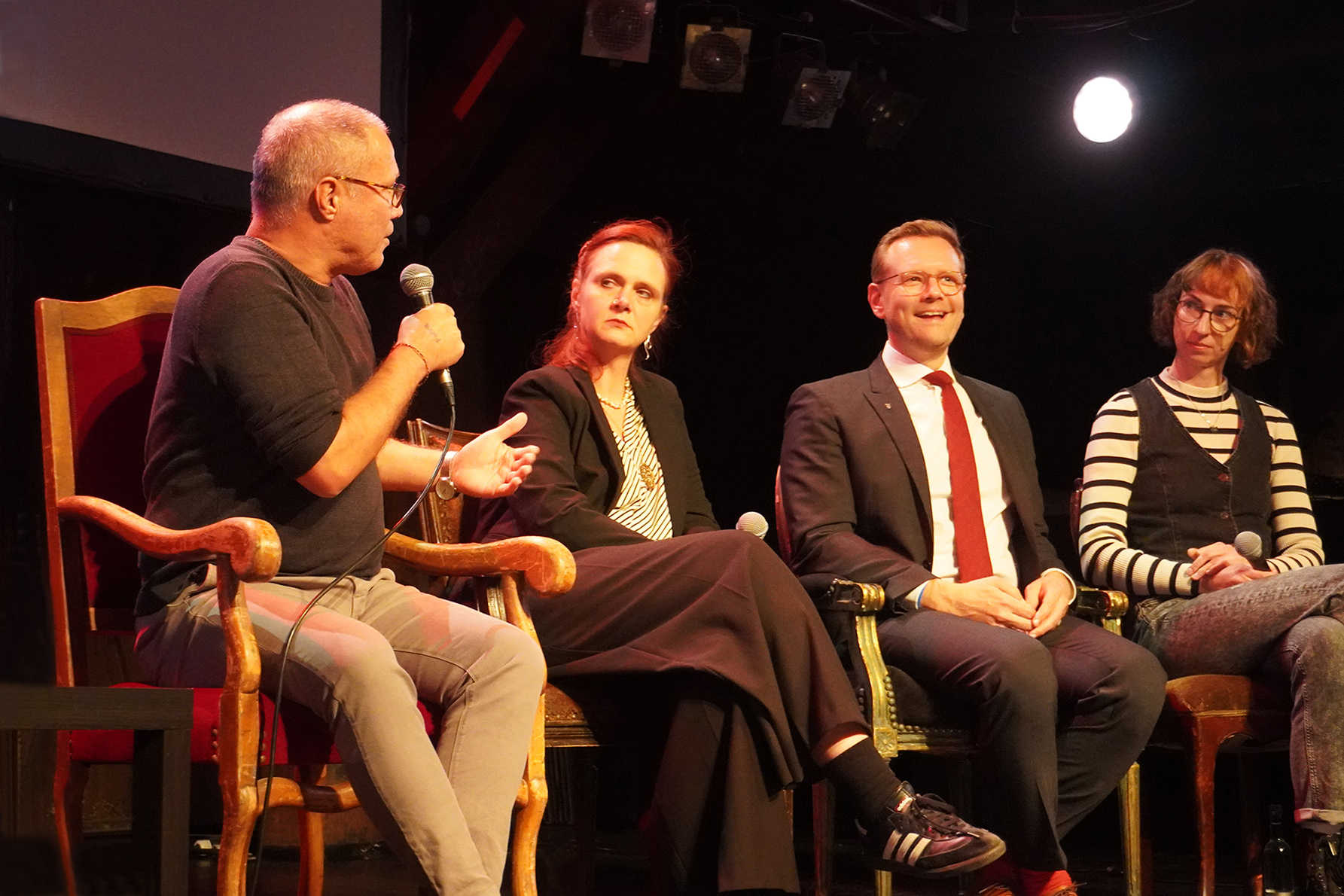
Panel »Culture under pressure in the East« with: Daniel Ris (Theatre Senftenberg), Daniel Morgenroth (Theatre Görlitz) Iris Helbing (Department of Culture), and Juliana Socher (Reading Stage Pirna), moderated by Linn Penelope Rieger (writer):
Morgenroth: »I must bring the sad news that Saxony, a land of culture, is on the verge of collapse.«
Socher: »For us, the pressure comes from a different direction: from the fact that, as the ›Literary Conspiracy‹, we have committed ourselves to making culture for everyone – in a city that has officially declared it wants to do nothing for everyone, with a mayor who doesn’t want to make politics for everyone.«
Helbing: »The climate has changed. (…) ›Jew‹ has once again become an insult; teenagers giving the Hitler salute in the schoolyard has become completely normal; friends of mine who are Muslim are constantly harassed when they wear a headscarf (…). It’s not a good climate, and it frightens me.«
Ris: »We also invite AfD voters, we exclude no one. But we say just as loudly what we have hanging on the door: no place for antisemitism, racism, or homophobia.« AUDIO [German]
Panel discussion on inner censorship: »I turned off the internet«
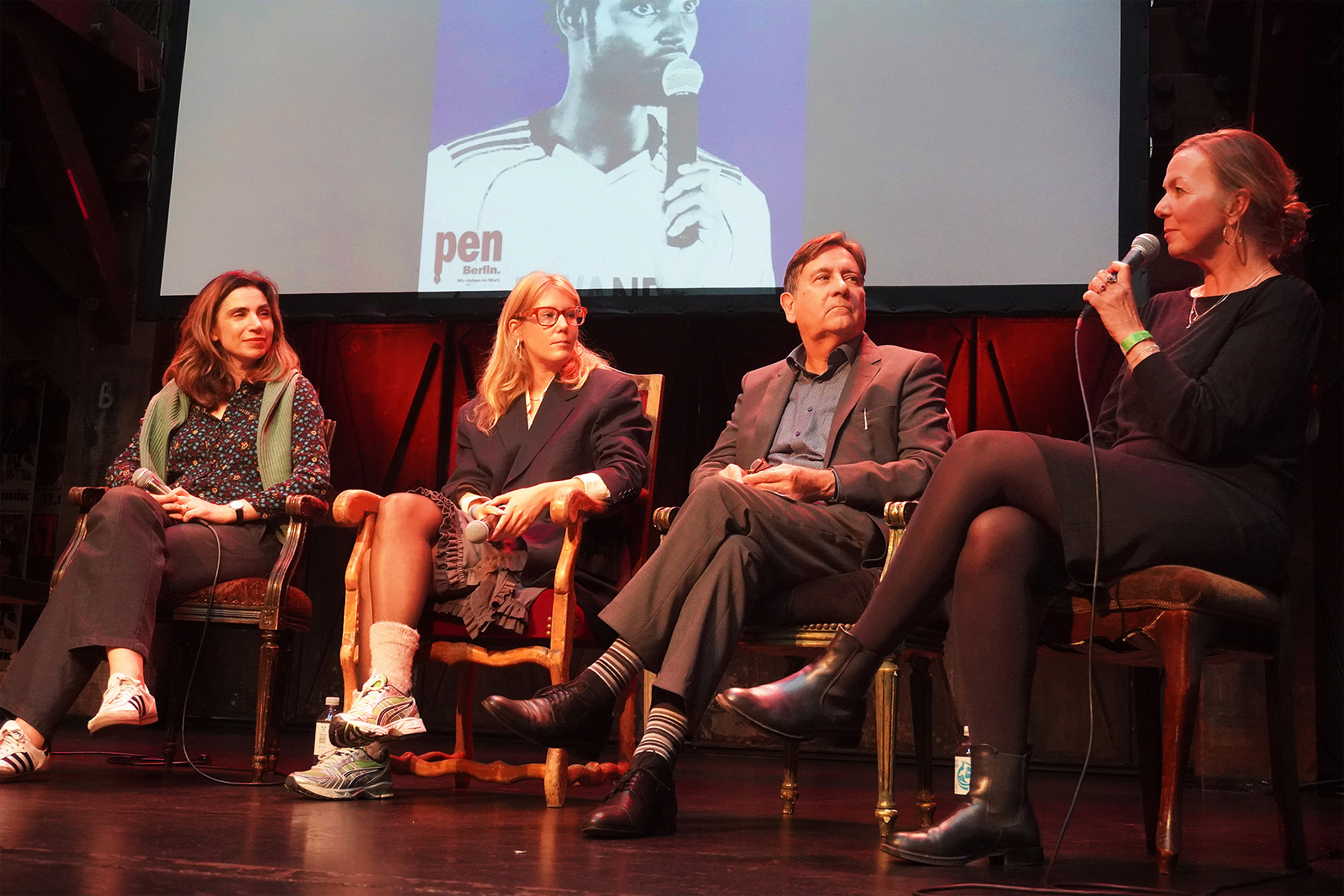
The writers Simone Buchholz, Dana Grigorcea, Jovana Reisinger, and Alain Claude Sulzer in talk with Jan Ehlert:
Reisinger: »Perhaps a certain small pair of scissors isn’t all that bad, because you can achieve a lot when you free yourself from stereotypes and clichés.«
Sulzer: »A work of fiction that relies on footnotes shouldn’t exist. The people who read it will understand why I use this word — not I, but this first-person narrator.«
Grigorcea: »People who are willing to embrace different perspectives when they read don’t react to a book with outrage. People react with outrage based on hearsay.«
Buchholz: »I turned off the internet. You can’t email me anymore unless you have my address. I’ve also switched off social media. Since then, I’ve been feeling much better — and I care a lot less.« AUDIO [German]
Writers in prison: Freedom for Pham Dong Trang, Alaa Abdel Fattah, Toomaj Salehi!
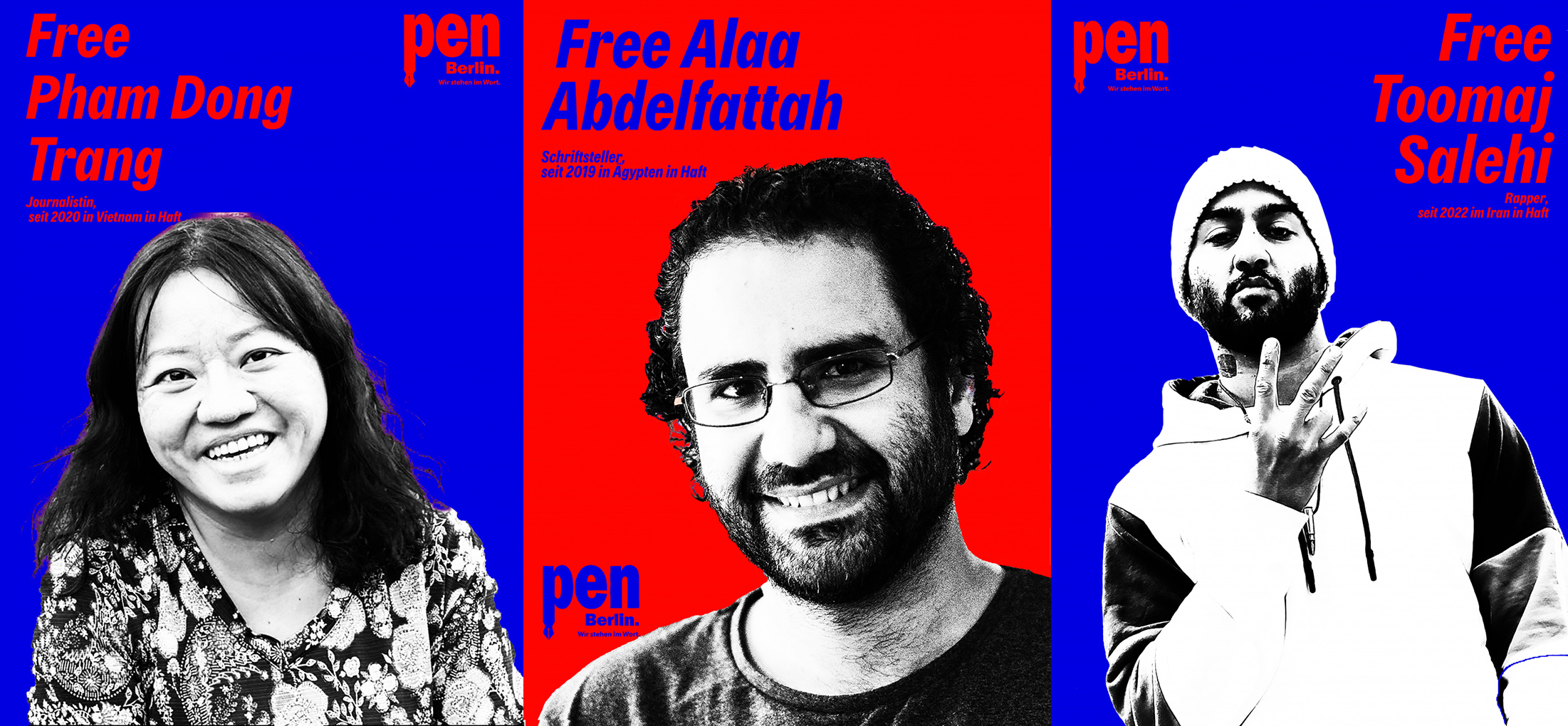
Alexandru Bulucz: »We call on the German authorities to pursue every possible diplomatic avenue to get, Toomaj Salehi out of the country, to a safe place where no one has to apologize for wishing a fundamentalist, unjust regime to hell.« Apart from the imprisoned Iranian rapper Toomaj Salehi the congress also focused on the prominent blogger and writer Alaa Abd el-Fattah (introduced by Sandra Hetzl), and on the Vietnamese writer and human rights activist Pham Dong Trang (introduced by Jayrôme Robinet). TEXTS AND AUDIOS [all in German]
Carsten Brosda: The public sphere is not a safe space
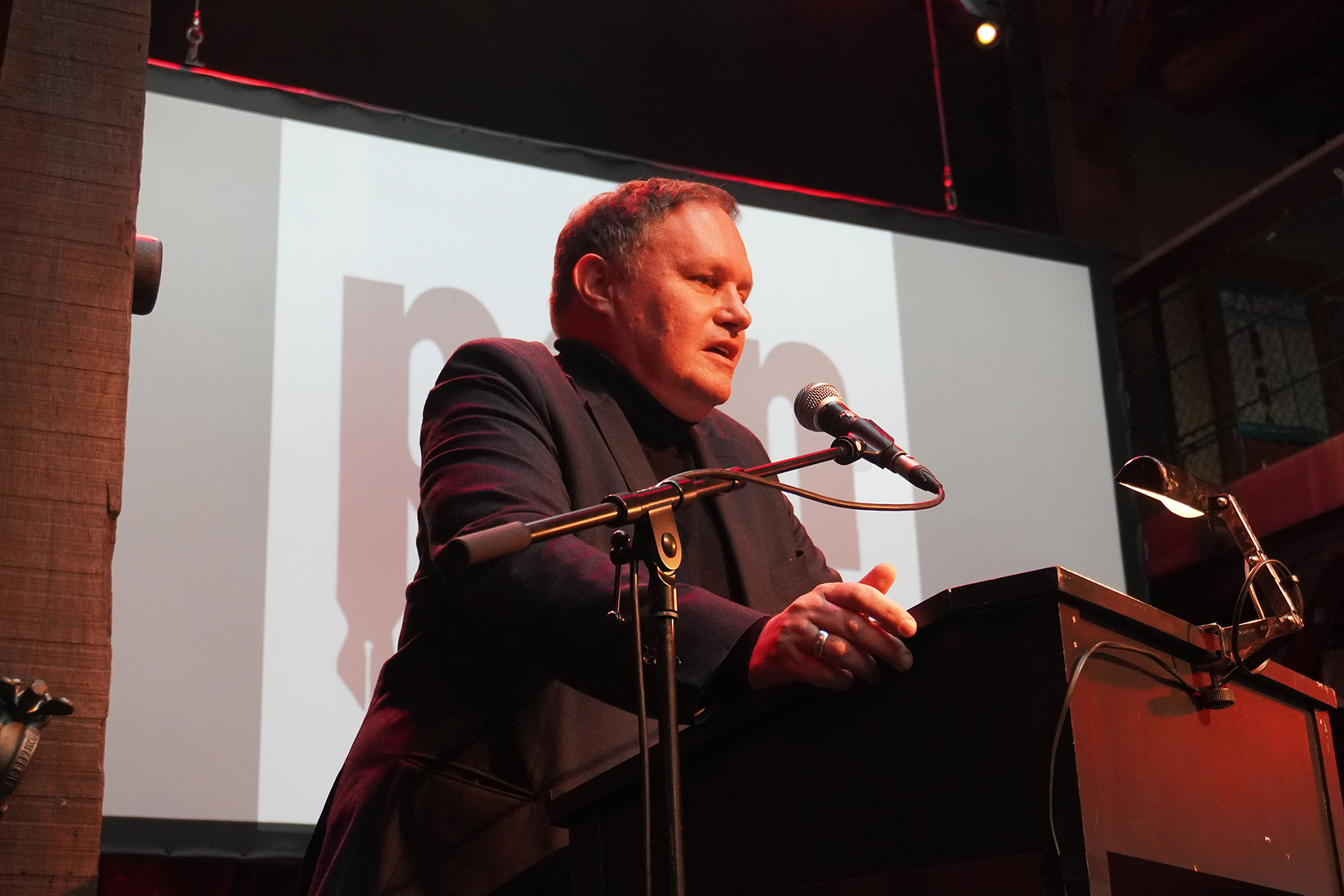
Message of greeting from Hamburg’s Senator for Culture: »It is not possible to organize the public sphere as a safe space. It is inconceivable to believe that freedom is without danger. It became dangerous the moment people – we’re in a port city – first set sail in a small boat and left their own bay. Because then I no longer knew where the rocks in the water were. I could run aground. The freedom to do so put my life at risk. Of course, I could have stayed on land – there I couldn’t drown, true. But I also wouldn’t have discovered the world. That means I cannot claim freedom without an awareness of the risks that come with it. Therefore, I also cannot discuss the question ›Do I need something like a public sphere?‹ in a pro-and-con mode.« TEXT und AUDIO [in German]
»Etgar Keret’s incredible achievement«: Media coverage of the Congress
Congress »On we go«: Programme
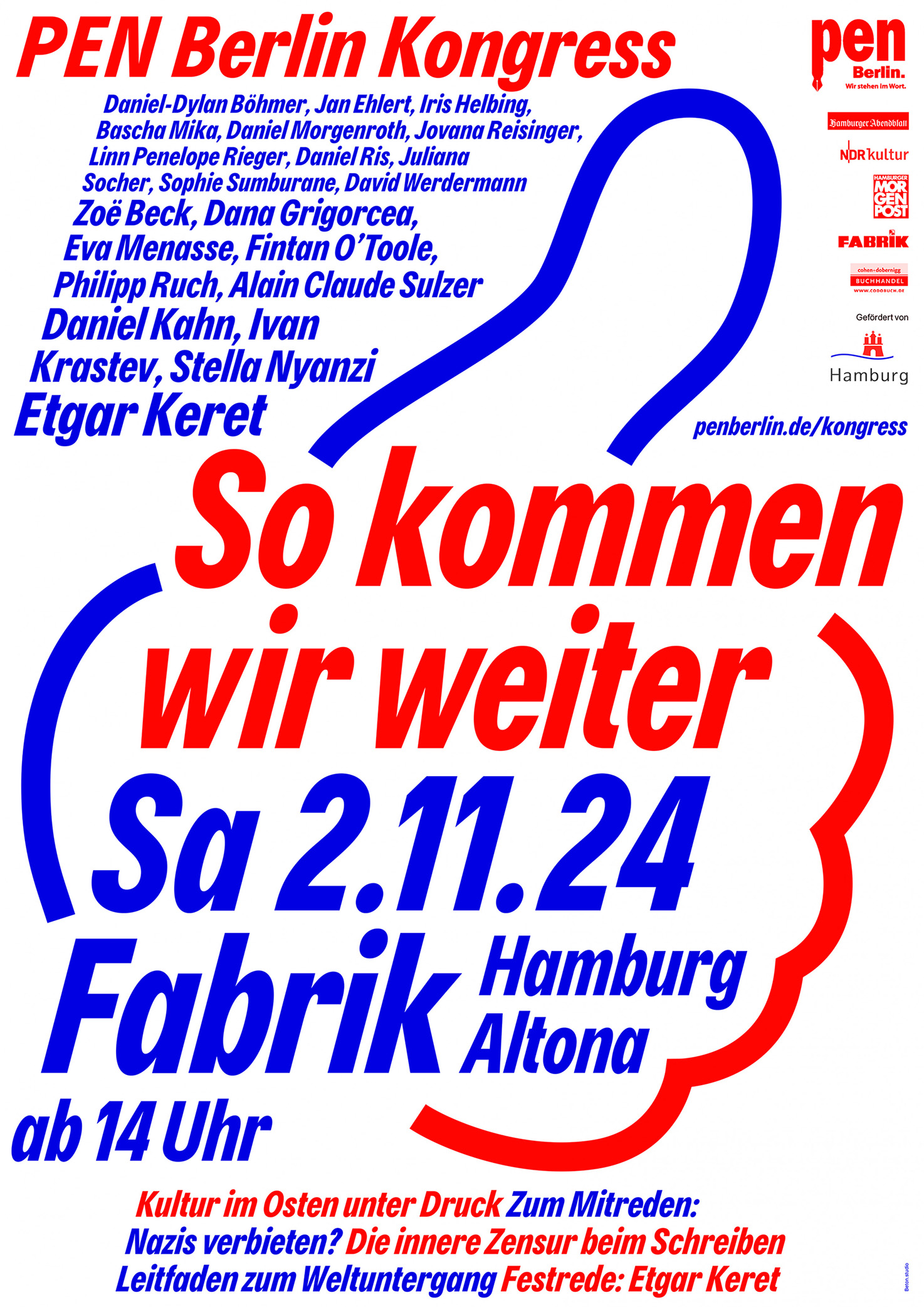
Fabrik Altona | Barnerstraße 36 | 22765 Hamburg
Saturday, 2nd November | Doors : 13 Uhr | Start: 2 pm
Journalist Bascha Mika will host the day, poet Alexandru Bulucz and translator Sandra Hetzl will talk about the situation of imprisoned authors.
2 pm | Opening speech by Eva Menasse (writer, spokesperson for PEN Berlin)
2.30 pm | Inner censorship in writing | Panel discussion
With : Simone Buchholz (writer), Dana Grigorcea (writer), Jovana Reisinger (writer) and Alain Claude Sulzer (writer). Host : Jan Ehlert (journalist/NDR)
3.45 pm | Handbook to the end of the world | Panel discussion
With : Ivan Krastev (political scientist) and Fintan O’Toole (journalist/Irish Times). Host : Eva Menasse (writer)
5 pm | Uganda: Gay persecution as reason of state? | Discussion with Stella Nyanzi (writer). Host : Sophie Sumburane (writer)
5.30 pm | Ban the Nazis? | Impulse talks and Discussion with the audience
With : David Werdermann (lawyer), Philipp Ruch (author) and the audience (audience). Host : Doris Akrap (journalist/taz) and Aron Boks (slam poet)
6.30 pm | Culture under pressure in the East | Panel discussion
With : Iris Helbing (head of the cultural office of Meiningen), Daniel Morgenroth (artistic director theater Görlitz), Daniel Ris (artistic director theater Senftenberg) and Juliana Socher (open stage Pirna). Host : Linn Penelope Rieger (writer)
7 pm | Keynote by Etgar Keret (writer) | Introduction by Daniel-Dylan Böhmer (journalist/Welt)
With : Doris Akrap (journalist) and Simone Buchholz (writer)
Supported by/in cooperation with :
